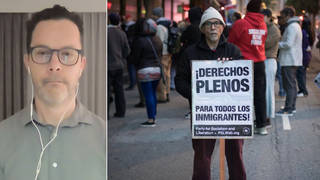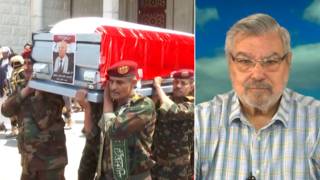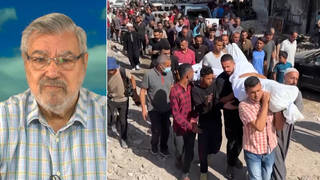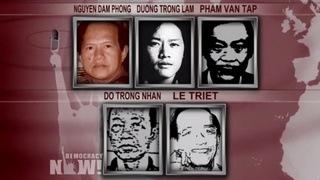
Guests
- Rick Rowleyproducer, writer and director of the Frontline documentary, Terror in Little Saigon. He was nominated for an Academy Award for Best Documentary Feature for the 2013 film Dirty Wars. He is an independent journalist with Big Noise Films.
- A.C. Thompsonproducer and correspondent of the Frontline documentary, Terror in Little Saigon. He is a staff reporter at ProPublica and co-author of Torture Taxi: On the Trail of the CIA’s Rendition Flights.
During the 1980s, five Vietnamese-American reporters were murdered in the United States. Despite lengthy FBI probes, none of the victims’ killers were ever brought to justice. Could a stunning new investigative documentary lead authorities to reopen the cases? We speak to journalists A.C. Thompson and Rick Rowley about their PBS Frontline report, “Terror in Little Saigon.” Thompson and Rowley uncover new evidence potentially tying a right-wing paramilitary Vietnamese exile group to the journalists’ deaths—and a U.S. government link that may have helped them evade justice.
Transcript
AMY GOODMAN: When journalists are killed for doing their job, their names often become known around the world, martyrs in the cause of media freedom. But we turn now to a series of killings that happened in this country but were all but ignored. During the '80s, five Vietnamese-American reporters were murdered. The killings shared key traits. All five victims appeared to be deliberately targeted. All five worked for small outlets serving the Vietnamese refugee community after the end of the Vietnam War in 1975. All had either voiced support for Vietnam's Communists or had published criticism of a right-wing paramilitary Vietnamese exile group called the National United Front for the Liberation of Vietnam, known as “the Front.” And despite a lengthy FBI investigation, none of the victims’ killers were ever brought to justice. But now the case is being re-examined in the new PBS Frontline documentary called Terror in Little Saigon.
NARRATOR: Years after the Vietnam War, a wave of terror and murdered journalists in the Vietnamese-American community.
NGUYEN NGUYEN: So they said, “Tell your father to stop what he’s doing, or he will pay the consequence.”
NARRATOR: No one was ever charged.
KATHERINE TANG-WILCOX: Somebody knows who’s responsible for each and every one of these acts.
NARRATOR: A shadowy group.
CLAUDIA KOLKER: For them, the war did not end.
NARRATOR: With plans to raise an army.
DOUG ZWEMKE: For them to pull that off in such a quick time, that takes money, that takes support.
NARRATOR: And some of the records are still classified.
STEPHEN ENGELBERG: So many things from that period have been declassified. What could still be a secret?
NARRATOR: ProPublica reporter A.C. Thompson investigates this cold case, searching for answers across the United States and in Thailand.
A.C. THOMPSON: Do you think the Bureau should reopen the investigation?
KATHERINE TANG-WILCOX: If new information has developed, oh, yeah.
AMY GOODMAN: An excerpt of the new documentary, Terror in Little Saigon. The journalist duo of correspondent A.C. Thompson and director Rick Rowley uncover new evidence potentially tying Front members to the journalists’ deaths—and a U.S. government link that may have helped them evade justice.
The Front was led by a group of former Vietnamese military officers from the U.S.-backed army of South Vietnam. They ran a militia out of Thailand to try to restart the Vietnam War. Meanwhile, here in the U.S., the Front had its own death squad, the K-9. In interviews with the filmmakers, five former K-9 members concede the group assassinated political opponents. One of the K-9 members also admits their responsibility for two of the journalists’ murders.
The documentary also reveals Richard Armitage, former deputy secretary of state, helped the Front’s leader obtain U.S. citizenship. And as a high-ranking Pentagon official, Armitage contacted Thai generals to back the Front’s effort to establish its base in Thailand. The FBI investigators suspected Front members of carrying out the killings, but never made a single arrest.
For more, we’re joined by the duo behind Terror in Little Saigon. A.C. Thompson is the documentary producer and correspondent and a staff reporter at ProPublica. And Rick Rowley is producer, writer and director of Terror in Little Saigon, independent journalist with Big Noise Films. He was nominated for the best documentary Academy Award for the 2013 film, Dirty Wars.
We welcome you both to Democracy Now! Rick Rowley, let’s begin with you. Why did you take on this story?
RICK ROWLEY: Well, when A.C. first approached me, it was—I think his email said something about “I have a story that might sound a little bit far-fetched to you. It’s about a death squad operating with impunity in the U.S. in the 1980s.” And that was immediately intriguing. But the more we dug into it, the more fascinating stories within stories were opened up onto. I mean, this was one of the most significant unsolved domestic terrorism cases in U.S. history, and it’s all but forgotten. And the group at the center of these killings, you know, five journalists, seven people, 30-some acts of terrorism across the United States over the course of a decade—it wasn’t done by ISIS or ISIL or some foreign group overseas. It was a group—at the center of all of this was a Cold War militia that was a part of the strange constellation of groups on America’s side of the Cold War during the ’80s.
AMY GOODMAN: I want to turn to a clip from Terror in Little Saigon. This is the beginning of the film. It tells the story of Houston newspaper editor Dam Phong Nguyen, who was killed in 1982 in front of his home in Houston.
A.C. THOMPSON: We tell ourselves that our work matters, that it’s worth the risk, that it will be remembered. When another journalist is killed, we rush to tell their story and to say to the world that their life was not wasted. And so it shouldn’t have taken this long to get here. Over 30 years late, I’ve arrived at Dam Phong’s grave. His case is three decades cold, without a conviction or an arrest. Just this headstone telling us that Dam Phong died for journalism.
TU NGUYEN: My dad was always controversial. Any time when you write the truth, and the truth is not for sale, you are controversial. My dad get threatened all the times.
A.C. THOMPSON: What do you remember about the day your father was killed?
TU NGUYEN: I wanted to know if he needed me to help him with the newspaper, the delivery. So I called home, and someone answered the phone. It was an American. I hung up. I thought I got the wrong number. I called him again. The same person introduced himself as a sergeant with the HPD. Then he said, “Son, you need to come home quick. There’s been an incident.” And then at that time I knew it was over.
NEWS ANCHOR: Houston police detectives are still trying to find out who killed Vietnamese newspaper editor Dam Phong Nguyen. Night Beat reporter Kathleen—
A.C. THOMPSON: Dam Phong’s sons gave me an old VHS tape.
REPORTER: Journalism was Dam Phong Nguyen’s life and possibly caused his death, according to—
A.C. THOMPSON: On August 24, 1982, this 44-year-old newspaper publisher and father of 10 was shot and killed in front of his home in Houston, Texas.
REPORTER: Nguyen’s 19-year-old son Tu wants to do political work to help other Third World—
A.C. THOMPSON: It’s strange to see their young faces back then, saying brave words for the camera.
TU NGUYEN: He died for his country. He died for the truth.
NGUYEN NGUYEN: The most important thing is freedom.
A.C. THOMPSON: It’s as if their story is frozen in time, without an ending.
NGUYEN NGUYEN: My father’s body was laying right over there. The blood drips all the way inside. My mother was on the phone with him, so she heard everything. And he said, “Honey, wait, I have to answer this door.” My mom heard the voice, that he talked to a person. And then, all of the sudden, my father screamed. And then the gunfire began.
A.C. THOMPSON: There was an audible sound—
NGUYEN NGUYEN: Yeah.
A.C. THOMPSON: —from the weapon.
NGUYEN NGUYEN: But no witness on the right, no witness up front.
A.C. THOMPSON: The police never made an arrest, but Dam Phong’s sons say his old papers are full of suspects.
NGUYEN NGUYEN: The clues are all here in his writing, in the newspaper.
A.C. THOMPSON: They tell me he was a dogged investigator whose stories on politics and corruption made him powerful enemies in the Vietnamese-American community.
NGUYEN NGUYEN: He received threats all the time. I heard some of the threats come on the phone. They said, “Tell your father to stop what he’s doing, or he will pay the consequence.”
A.C. THOMPSON: How many of these threats do you remember getting on the phone, that you heard?
NGUYEN NGUYEN: At least three a week.
AMY GOODMAN: The story of Dam Phong Nguyen, who was killed in 1982 in front of his Houston home, being interviewed by A.C. Thompson, who’s also with us from Berkeley, California. A.C., you’ve been working on this story for several years. How is it that no one was brought to justice in these killings?
A.C. THOMPSON: Well, that was one of the fundamental questions that we set out to ask. It was baffling to me, when I started looking into these cases, that you could have this wave of terror and no one would be arrested. Here’s what I think. Looking at the documents, interviewing people involved, you can see early on local police departments really didn’t know how to deal with these cases. They didn’t understand the political nature of them. They didn’t realize that these were terror cases, early on, and so they made crucial mistakes.
The FBI started looking at these cases in the '80s. And for a long time, in some FBI offices, there was another big mistake being made, that these were chalked up again as sort of singular incidents that weren't linked to one another. So, for example, in the San Francisco FBI office, the first killing happened in 1981. All the way to 1987, the FBI was acting as if there was no politics, that it wasn’t an act of terror, and it wasn’t linked to other cases. Those were sort of crucial failings, I think, on law enforcement’s part.
Beyond that, when the FBI finally started taking these cases seriously, 15 years after the first killing, in 1995, they really had trouble penetrating the inner layers of the group they were looking at, the Front, and really getting people to spill the beans and really talk about what happened.
AMY GOODMAN: Let’s turn to another clip from Terror in Little Saigon, featuring former Front member Tran Van Be Tu.
A.C. THOMPSON: I learned of a former Front member who spent years in prison. He had shot a man in Orange County over statements he made to the L.A. Times calling for dialogue with the Communist government of Vietnam. The would-be assassin’s name is Tran Van Be Tu, and he agrees to meet me at a hotel just off the expressway.
So he came out of this pho shop.
TRAN VAN BE TU: Yeah, yeah, and we tried to get him in the car. But he grabbed my hand like this. Look. Just, just—when I go like this, I shoot. He fell like a tree. Pah! I thought maybe died. Communists are like sick, sick people. So, let the sick people, they die. They die.
A.C. THOMPSON: No regret, no remorse. For Be Tu, this was not attempted murder, it was an act of war.
TRAN VAN BE TU: We feel proud to do that. To me, I don’t call me that a hero, you know, but that time, in Orange County, they called us like a hero.
A.C. THOMPSON: Be Tu had been a hardcore Front member. He says they’d even tried to recruit him to join K-9. But he split from the group before the shooting.
So you were recruited to join the K-9 organization, is that right?
TRAN VAN BE TU: Right, right.
A.C. THOMPSON: And it was your understanding that K-9 was a hit squad or some kind of secret operations squad, is that right?
TRAN VAN BE TU: Exactly. That’s a secret unit, yes.
A.C. THOMPSON: Each chapter had people who were in the K-9, so Houston, San Jose, Orange County, is that right?
TRAN VAN BE TU: Could be. Could be. Yes.
A.C. THOMPSON: Dam Phong’s family think that Dam Phong is criticizing the Front, and that got him killed. Does that sound accurate to you?
TRAN VAN BE TU: That’s what I heard, you know. That’s what I heard many, many times from people, our people, around. K-9 is professional. They do good job, but they never get caught.
A.C. THOMPSON: Do you know the name of the person who killed Dam Phong?
TRAN VAN BE TU: Sound like you are FBI.
AMY GOODMAN: Former Front member Tran Van Be Tu, interviewed by A.C. Thompson in Terror in Little Saigon. The film also reveals a surprising connection between a high-ranking U.S. government official and a member of the Front.
A.C. THOMPSON: A few months before his death, Dam Phong went to Thailand, investigating the Front’s base there and its leader, Hoang Co Minh. I had focused on the Front’s U.S. leadership. But when I opened Minh’s file, everything changes. On his citizenship application, he assumes a Japanese cover name: William Nakamura. The home address he cites belongs to an adviser for the U.S. National Security Council. And a surprising name shows up: Richard Armitage, a top Pentagon official. The documents also show the Pentagon asked for Hoang Co Minh’s naturalization to be expedited. And their request is followed by six blank pages that have been redacted for national security reasons. It’s the immigration application of a man who’s been dead for almost 30 years. What possible national security reason would keep them classified now?
AMY GOODMAN: A clip from Terror in Little Saigon. A.C. Thompson, more on Armitage and what you discovered?
A.C. THOMPSON: Well, you know, when we spoke to former Front members, we’d say, “Hey, was the CIA involved in this? Was there someone helping you in the U.S. government?” And they would all say, “No, the CIA didn’t help us.” But the name Richard Armitage kept coming up. They kept saying, “He was our patron. He was the person that seemed to be supporting us.”
We came to Armitage, and we said, “Hey, this is what we’ve been hearing. Is there any truth to this?” And he said, “I made an introduction between the leader of the Front and the Thai military. It wasn’t in person, but I told the Thai military, 'Hey, this is a great officer. I knew him,' etc., etc.” And we believe that that introduction helped the Front set up its base in Thailand, from which it tried to invade Vietnam on three occasions. Now, Armitage says, “I warned the Thais that we’re not supporting these guys officially through the U.S. government. I don’t think this is a good idea.” But he does seem to have made this introduction that really helped the group set up its cause.
AMY GOODMAN: Rick Rowley, the leaders of the Front are leaders of their community today.
RICK ROWLEY: Yeah, it is a—one of the things that is kind of tragic, I think, you know, looking at the story as a journalist, is that—like Dam Phong, for instance. He knew his killers were coming. He was getting death threats for weeks before he was killed. People—he had angry meetings where leaders of the Front told him to stop publishing what he was publishing. And he saw his killers coming, and he let them come. He kept publishing, because he thought that his work was worth it, was worth the risk, and that, you know, he—it will be remembered after he was gone, and that if something happened to him, other journalists would flock to his story and pick up the threads of his reporting and would hold accountable the people who were responsible for his killing. But now, you know, 30 years later, he was wrong. I mean, the terrorists won. His stories were all but forgotten. We think that the Houston police didn’t even translate the newspapers that he was publishing. And yet, the group—the leaders of the group that were at the center of his criticism and his writing, they remain prominent members in their community.
AMY GOODMAN: A.C. Thompson, we have 10 seconds. The information that you have gathered, is this going to cause the reopening of these murders?
A.C. THOMPSON: You know, I have no idea. I certainly think there are new leads here. Should anyone want to follow them, there is new information.
AMY GOODMAN: We’re going to do Part 2 of this conversation online at democracynow.org. I want to thank A.C. Thompson and Rick Rowley for this remarkable documentary that aired on Frontline, Terror in Little Saigon.
That does it for our broadcast. Democracy Now! is hiring a development director. Check our website at democracynow.org. And we have internships. Check there.
WATCH PART 2
Terror in Little Saigon: The Shocking Story of a Vietnamese Death Squad Killing 5 Journalists in US












Media Options